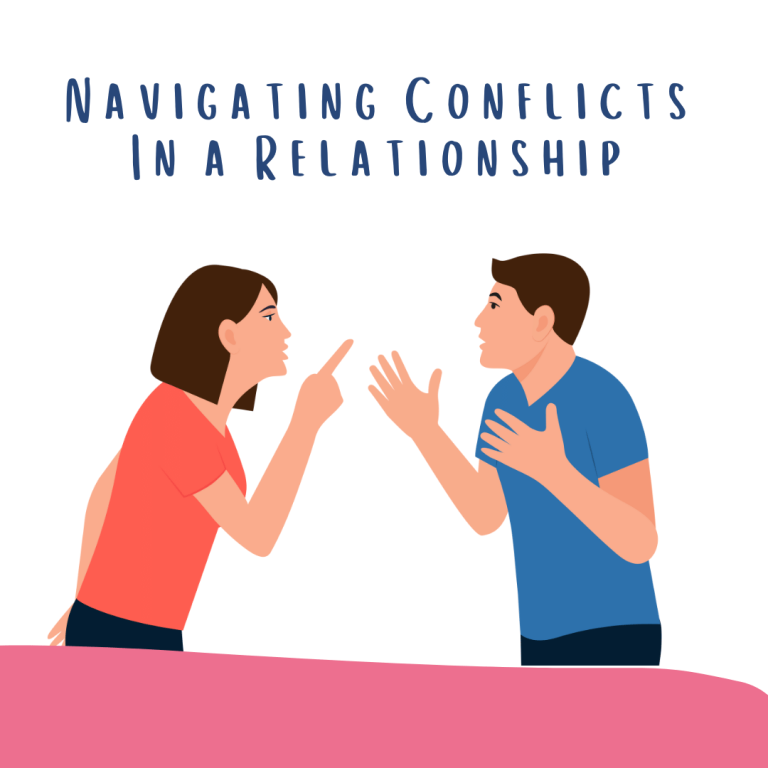
Navigating Conflict in Relationships: Effective Techniques for Managing Disagreements
Have you ever been in an argument with your partner that left you frustrated and unsure of how to resolve the disagreement? It’s a common experience that can leave us baffled, angry, and disconnected. For instance, let’s consider John and Emily. They had been together for three years. Although they loved each other, they often found themselves bickering over trivial things. One day, they got into a heated argument about how to divide household chores, and the situation quickly escalated into a full-blown fight. If you can relate to John and Emily’s experience, then you’re not alone.
Conflict is a natural part of any relationship. And learning to navigate disagreements healthily is crucial for building a strong and lasting connection. In this article, we’ll explore evidence-based strategies for managing conflicts in a relationship. These will help you resolve disagreements in a way that strengthens your bond rather than tearing it apart. Whether you’re newly dating or have been married for years, keep reading to learn how to navigate conflict in a way that promotes healthy communication, mutual understanding, and lasting love.

Healthy Communication in Relationships
Healthy communication is the cornerstone of managing conflicts in any relationship. When disagreements arise, it’s essential to approach the situation calmly and with an open mind. According to a study by the University of Georgia, couples who use “I” statements instead of “you” statements are more likely to resolve their disagreements in a healthy way. Additionally, the study found that avoiding criticism and blame during conflict can promote better communication and lead to more positive outcomes. This means paying attention to your partner’s words, asking open-ended questions, and understanding their perspective. Practicing healthy communication techniques can create a foundation of trust and respect that allows couples to manage conflict more effectively.
However, communication is not just about avoiding negative behaviours; it is also about actively working towards understanding your partner’s perspective. This is where perplexity comes into play: asking questions and actively listening to your partner can help you gain valuable insights into their standpoint and find a resolution that works for both of you
Additionally, research from the Gottman Institute suggests that couples who use positive emotions during conflict are more likely to maintain their connection and avoid negative patterns of behaviour.
One evidence-based tip for practising healthy communication is to use “I” statements instead of “you” statements. This can help you express your feelings without blaming or attacking your partner. For example, instead of saying, “You always forget to take out the trash,” you could say, “I feel frustrated when the trash is not taken out on time.” This approach is less likely to put your partner on the defensive and more likely to promote open and constructive dialogue.
Another key component of healthy communication is active listening. According to a study by the University of Michigan, couples who practise active listening techniques, such as restating their partner’s perspective and summarising what they heard, are more likely to feel heard and understood during the conflict. Active listening also promotes empathy and can help both partners feel more connected and supported. You can use these strategies to manage conflicts healthily and constructively.
5 Effective Conflict Resolution Strategies for Couples

Resolving conflicts in a relationship can be tough. However, it is possible to find solutions that work for both partners by incorporating effective conflict resolution strategies. According to research from the University of California, couples who practise empathy, compromise, positive problem-solving skills, taking a break, finding common ground, and collaborating are more likely to successfully resolve their conflicts.
1. Identifying an escalation
It’s easy for a simple disagreement to snowball into a full-blown argument. The key is to recognize the signs of escalation, such as raised voices, negative language, or physical gestures, and take steps to de-escalate the situation. This can include taking a break, practising relaxation techniques, or using humour to diffuse tension.
2. Focusing on what you agree more
When you’re in the heat of an argument, it’s easy to focus on what you disagree on. But shifting your focus to what you agree on can help you find common ground and work towards a resolution. This can include identifying shared goals or values, acknowledging each other’s perspectives, and recognizing the positive aspects of your relationship.
3. Exploring underlying needs, fears, and dreams
Oftentimes, conflicts are rooted in unmet needs or unexpressed fears and dreams. By taking the time to understand each other’s underlying motivations, you can find solutions that address the root cause of the conflict. This can include asking open-ended questions, practising active listening, and being curious about your partner’s perspective.
4. Separating your reality from your partner's
It’s easy to fall into the trap of assuming that your partner thinks and feels the same way as you do. But recognizing that your partner’s reality may be different from yours can help you approach conflicts with more empathy and understanding. This can include acknowledging and validating your partner’s feelings, reframing the situation from their perspective, and practising empathy and compassion.
5. Taking breaks and repair
Sometimes, conflicts can become overwhelming, and it’s important to take a break to calm down and regroup. This can include taking a few deep breaths, going for a walk, or engaging in a calming activity. Additionally, after a conflict has been resolved, it’s important to take steps to repair any damage that may have been done to the relationship. This can include apologising, showing appreciation, and reaffirming your commitment to the relationship.

How to Avoid Escalating Conflicts in Your Relationship:
Managing conflicts in a relationship can be challenging, especially when emotions run high. However, recognising the early signs of conflict and taking steps to de-escalate the situation can prevent it from worsening. According to research from the University of Texas, couples who practise relaxation techniques such as deep breathing or visualisation are better equipped to manage conflict healthily. These techniques can help reduce stress and promote a sense of calm, making it easier to approach conflict with a clear mind.
Taking a time-out is another effective technique for preventing conflicts from escalating. It involves stepping away from the situation and taking some time to cool down. Research from the University of Maryland suggests that taking a time-out can be effective to reduce emotional arousal and promote positive communication. Returning to the conversation after the emotions have subsided might help both partners address the issue with a clearer perspective and greater understanding.
In addition to relaxation techniques and taking a time-out, healthy communication is also essential for avoiding escalating conflicts in a relationship. This means paying attention to your partner’s words, asking open-ended questions, and understanding their stance. By practising healthy communication techniques, couples can create a foundation of trust and respect. This will allow them to manage conflict more effectively.
Couples can build stronger and more supportive relationships by approaching conflict with a clear mind and a positive attitude.
The Benefits of Seeking Professional Help for Relationship Conflicts:

Relationships can be complex, and conflicts can arise even in the healthiest of partnerships. When disagreements become overwhelming or persistent, seeking professional help can be a valuable step. It will help you manage conflicts and strengthen the relationship. Some of the benefits of seeking professional help for relationship conflicts include:
Gain a New Perspective: A professional therapist can provide a fresh perspective on the issues a couple is facing. They can help in identifying the root cause of conflicts as well as underlying patterns of behaviour that may be contributing to the problem.
Learn New Communication Skills: Effective communication is a crucial component of healthy relationships, and a professional therapist can teach partners new communication skills that can help them to better understand each other’s needs and work through conflicts constructively.
Identify Negative Patterns: A therapist can help couples identify negative patterns in their relationship that may be contributing to conflicts. By addressing these patterns and learning new ways of relating to each other, one can build a stronger and more fulfilling relationship.
Build a Stronger Relationship: Seeking professional help for relationship conflicts can be an investment in the long-term success of the partnership. By learning new skills and gaining a deeper understanding of each other, one can build a stronger foundation for a fulfilling and rewarding relationship.
Safe and Confidential Environment: Professional therapy provides a safe and confidential environment. Here, you and your partner can share your thoughts and feelings without fear of judgement. This can create a space for honest and open communication, which can be crucial in resolving conflicts and building stronger relationships.
Whether you’re dealing with specific issues or just looking to strengthen your relationship, a professional therapist can provide guidance, support, and new skills to help you navigate conflicts healthily and constructively.
Conflicts are a natural part of any relationship, but managing them healthily and constructively is crucial for building a strong and fulfilling partnership. By incorporating evidence-based strategies like positive problem-solving skills, taking a break, practising empathy and compromise, finding common ground, using healthy communication techniques, and seeking professional help, couples can navigate conflicts and build a stronger, more supportive connection.
At times, navigating relationship conflicts can be challenging and overwhelming. However, by recognising the early signs of conflict, staying open to new perspectives, and working collaboratively towards solutions, couples can overcome even the most difficult challenges.
Remember, building a healthy and fulfilling relationship takes time, effort, and a commitment to working together. By incorporating the strategies and techniques discussed in this blog post, couples can navigate conflicts constructively and positively and build a strong foundation for a long-lasting and rewarding relationship.
So, whether you’re just starting a new relationship or you’ve been together for years, remember that conflicts are a natural part of any partnership. By approaching them with a positive attitude, an open mind, and a willingness to work together, you can overcome challenges and build a strong, supportive relationship that stands the test of time.

